Unit 4 Don’t eat in class 课件(共81张PPT)英语人教新目标(Go for it)版七年级下册
文档属性
| 名称 | Unit 4 Don’t eat in class 课件(共81张PPT)英语人教新目标(Go for it)版七年级下册 |
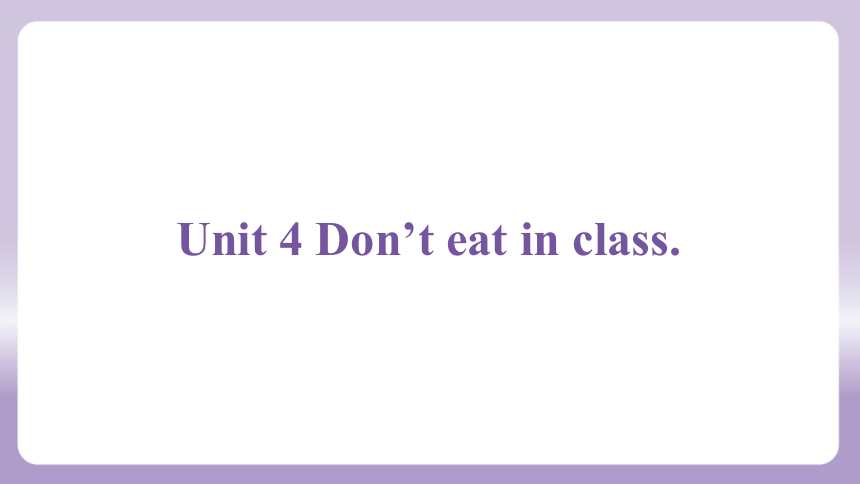
|
|
| 格式 | pptx | ||
| 文件大小 | 1.9MB | ||
| 资源类型 | 教案 | ||
| 版本资源 | 人教新目标(Go for it)版 | ||
| 科目 | 英语 | ||
| 更新时间 | 2024-05-17 08:54:55 | ||
图片预览

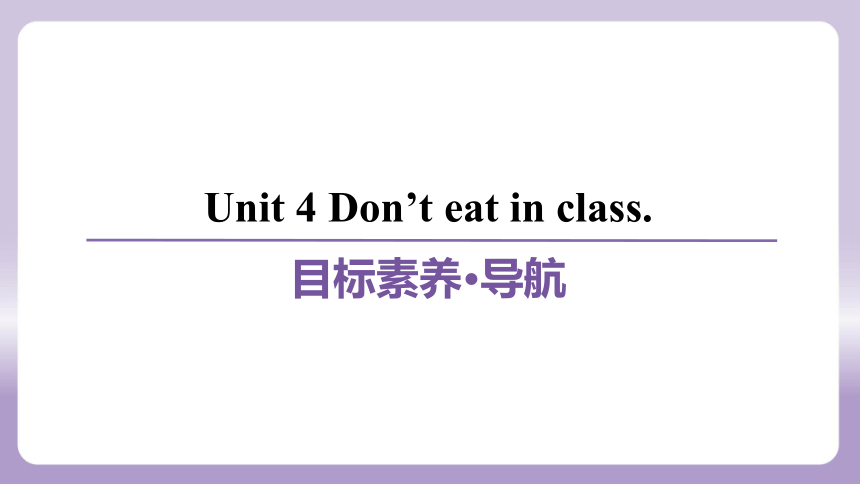
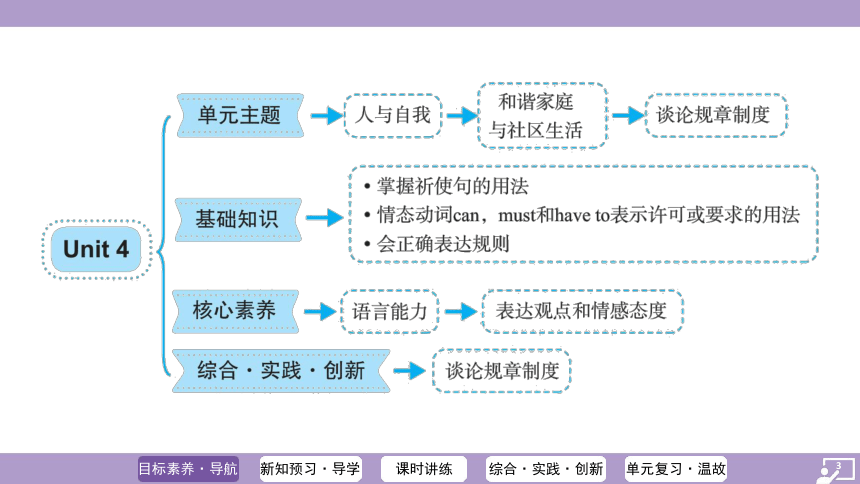
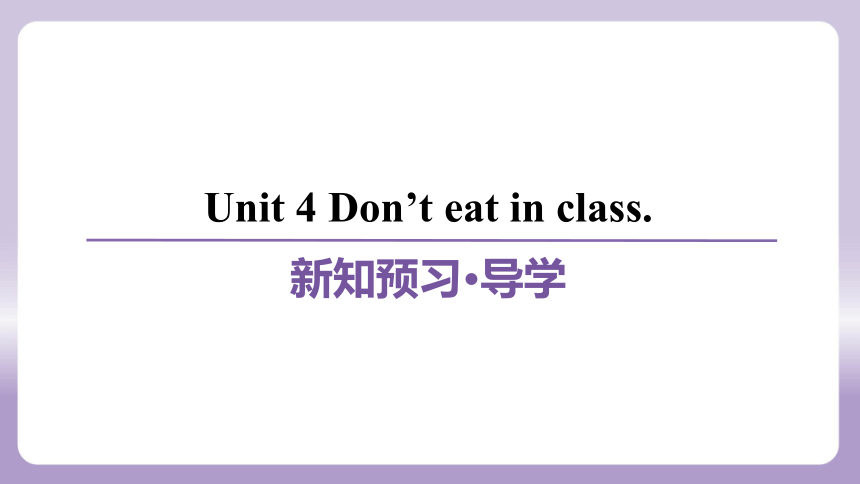

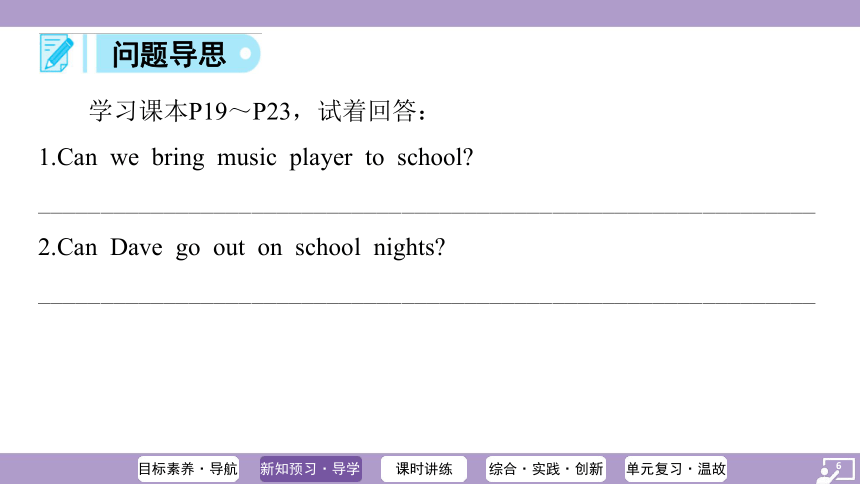
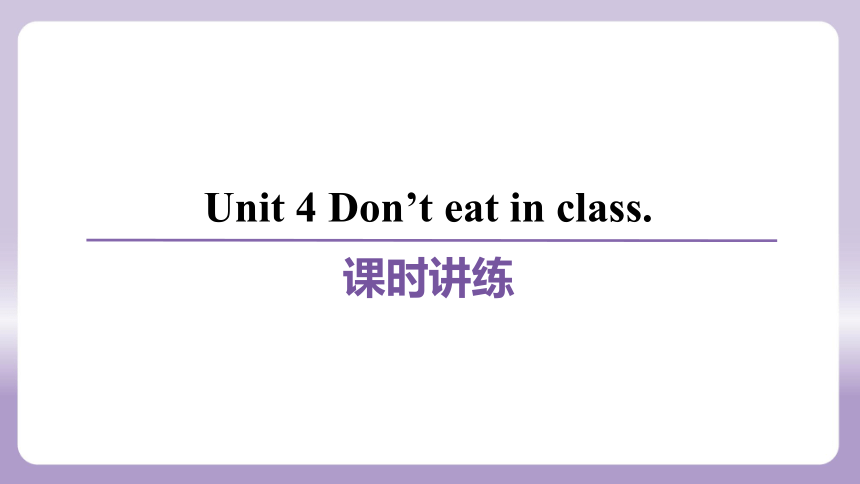
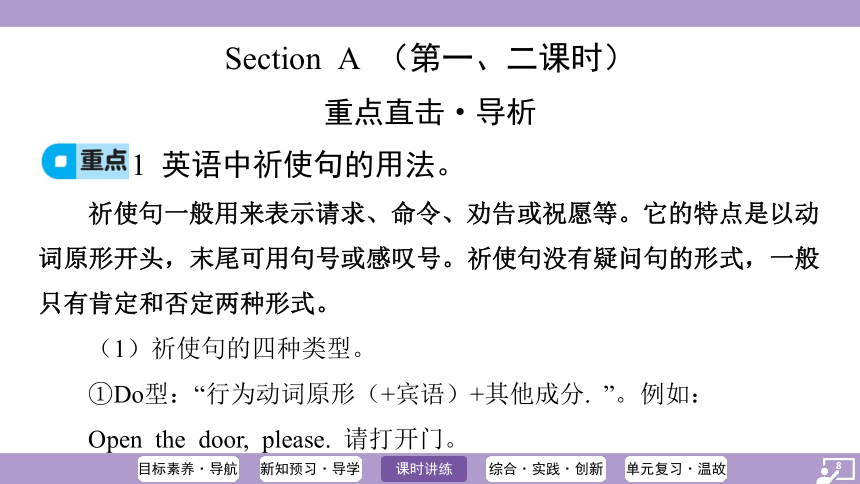
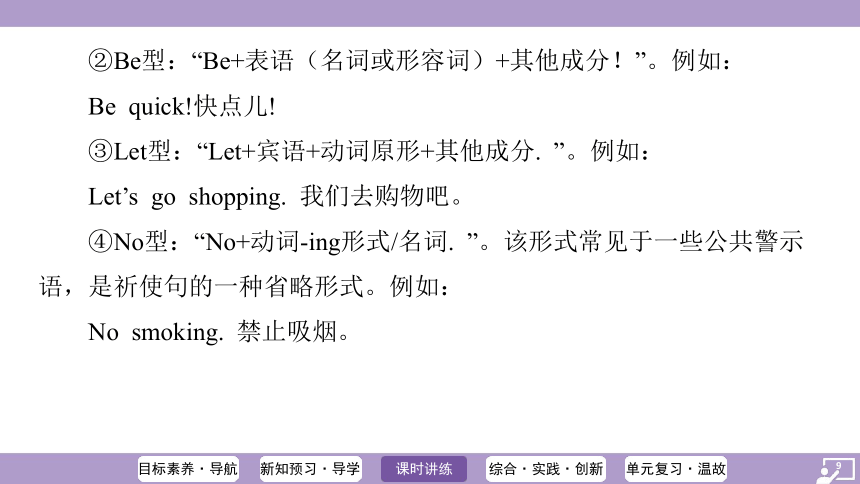
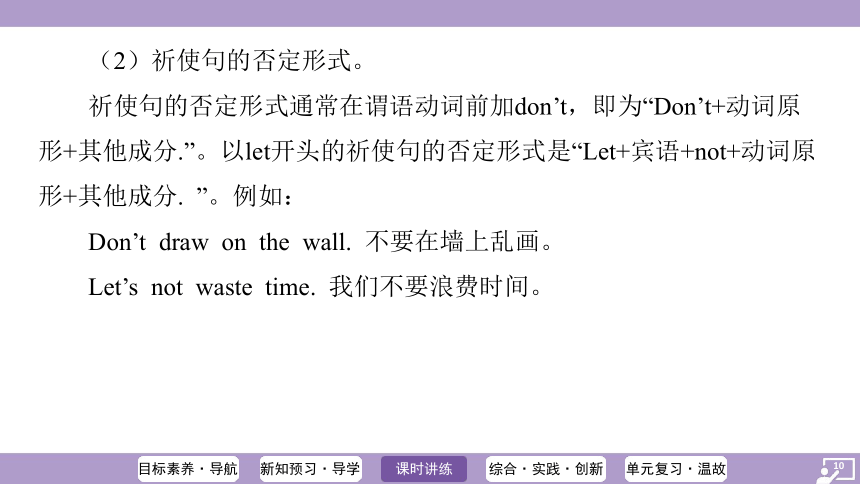
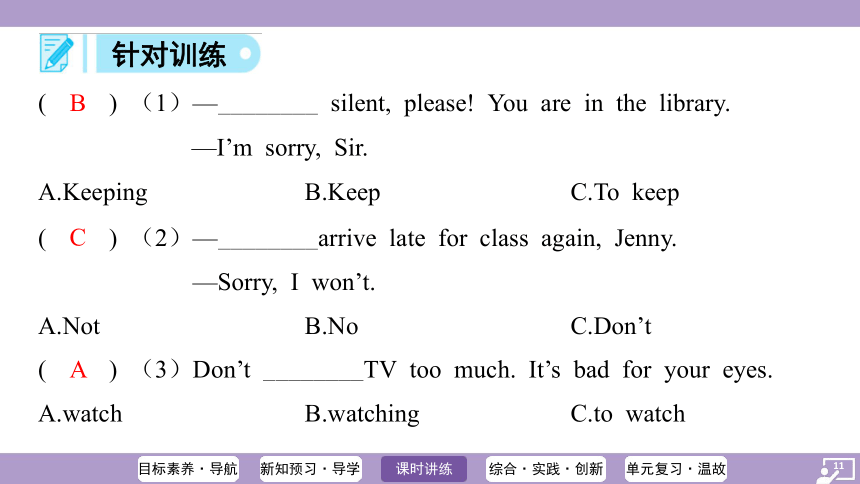
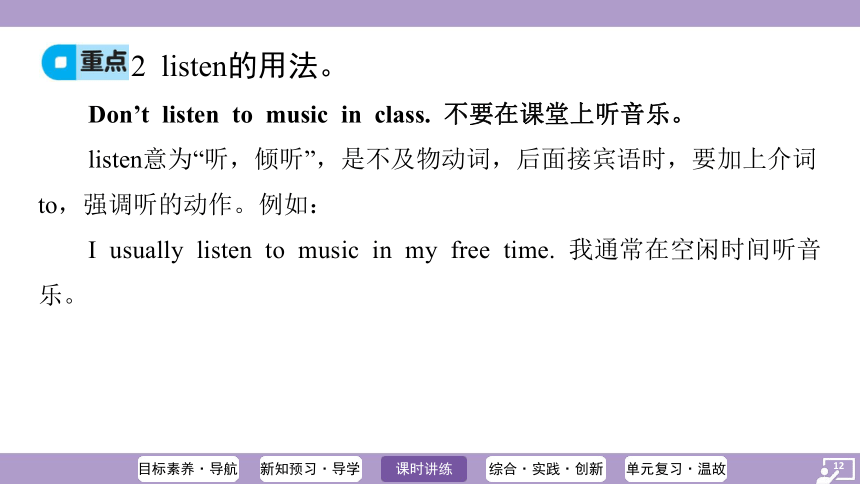
文档简介
(共81张PPT)
Unit 4 Don’t eat in class.
Unit 4 Don’t eat in class.
目标素养·导航
Unit 4 Don’t eat in class.
新知预习·导学
知识梳理
在公共场所你是否注意到以下这些标志 你知道它们都是什么意思
吗?请你用英语说一说。
问题导思
学习课本P19~P23,试着回答:
1.Can we bring music player to school
______________________________________________________________
2.Can Dave go out on school nights
______________________________________________________________
Unit 4 Don’t eat in class.
课时讲练
Section A (第一、二课时)
重点直击·导析
1 英语中祈使句的用法。
祈使句一般用来表示请求、命令、劝告或祝愿等。它的特点是以动词原形开头,末尾可用句号或感叹号。祈使句没有疑问句的形式,一般只有肯定和否定两种形式。
(1)祈使句的四种类型。
①Do型:“行为动词原形(+宾语)+其他成分. ”。例如:
Open the door, please. 请打开门。
②Be型:“Be+表语(名词或形容词)+其他成分!”。例如:
Be quick!快点儿!
③Let型:“Let+宾语+动词原形+其他成分. ”。例如:
Let’s go shopping. 我们去购物吧。
④No型:“No+动词-ing形式/名词. ”。该形式常见于一些公共警示语,是祈使句的一种省略形式。例如:
No smoking. 禁止吸烟。
(2)祈使句的否定形式。
祈使句的否定形式通常在谓语动词前加don’t,即为“Don’t+动词原形+其他成分.”。以let开头的祈使句的否定形式是“Let+宾语+not+动词原形+其他成分. ”。例如:
Don’t draw on the wall. 不要在墙上乱画。
Let’s not waste time. 我们不要浪费时间。
针对训练
( ) (1)—________ silent, please! You are in the library.
—I’m sorry, Sir.
B
A.Keeping B.Keep C.To keep
( ) (2)—________arrive late for class again, Jenny.
—Sorry, I won’t.
C
A.Not B.No C.Don’t
( ) (3)Don’t ________TV too much. It’s bad for your eyes.
A
A.watch B.watching C.to watch
2 listen的用法。
Don’t listen to music in class. 不要在课堂上听音乐。
listen意为“听,倾听”,是不及物动词,后面接宾语时,要加上介词to,强调听的动作。例如:
I usually listen to music in my free time. 我通常在空闲时间听音乐。
【辨析】listen与sound的用法区别。
(1)listen意为“听”,侧重听的动作。例如:
Listen! The birds are singing happily in the tree. 听! 鸟儿在树上快乐地歌唱。
(2)sound意为“听起来”,是连系动词,后面跟形容词作表语,构成主系表结构。例如:
The story sounds interesting. 这个故事听起来很有趣。
针对训练
( ) (1)—What’s this
—It’s my music player. I like to ________ music.
B
A.talk with B.listen to C.get to
( ) (2)You must ________ the teacher carefully(认真地).
C
A.to listen B.listens to C.listen to
3 arrive的用法。
Don’t arrive late for class. 上课不要迟到。
arrive意为“到达”,是一个不及物动词,后面不能直接跟表示地点的名词。如果要跟名词,就必须加介词in或at。arrive at后面接小地点,arrive in 后面接大地点。例如:
We must arrive at the railway station before 8:00.我们必须在8点前到达火车站。
Mr. Zhang will arrive in Beijing next Monday. 张先生将在下星期一到北京。
【注意】arrive 后面接表示地点的副词here,there,home时,不需要跟介词。例如:
arrive here到达这里; arrive there 到达那里; arrive home到家
针对训练
( ) (1)The plane arrives ________ Shanghai ________ ten in
the morning.
B
A.at; in B.in; at C.at; at
( ) (2)As students, we can’t ________ late for class.
A
A.arrive B.arrive at C.arrive in
( ) (3)Bruce can arrive ________here before 8:00.
C
A.in B.at C.\
4 must的用法。
We must be on time. 我们必须按时到达。
must是情态动词,表示“必须;一定”,其后接动词原形。例如:
As students, we must obey the school rules. 作为学生,我们必须遵守校规。
【注意】由must引起的疑问句,肯定回答要用must,否定回答要用needn’t或don’t have to,意为“不必”。例如:
—Must I finish the work today 我今天必须完成这项工作吗
—Yes, you must. / No,you needn’t. 是的,你必须。/不,你不必。
针对训练
( ) (1)—________ I finish my homework at school
—No, you ________. You can do it at home.
B
A.Can; have to B.Must; don’t have to C.Must; can’t
( ) (2)—Must I clean my room right now
—No, you ________.
A
A.needn’t B.mustn’t C.can’t
5 bring的用法。
Can we bring music players to school 我们可以把音乐播放机带来学校吗?
bring是动词,意为“带来;拿来”。例如:
Please remember to bring your dictionary to the classroom tomorrow. 请记得明天把你的字典带到教室来。
【辨析】bring和take的用法区别。
(1)bring指从别处将某人或者某物带到说话人所在的地方。例如:
Please remember to bring your homework to school. 请记住把你们的家庭作业带到学校。
(2)take意为“带走,拿走”时,指把某人或者某物从说话人所在地带走。例如:
It’s going to rain. You should take an umbrella with you. 要下雨了。你应该带把伞。
针对训练
( ) —Linda, you can’t ________ your telephone to school.
—Sorry, Mr. Zhang. I won’t do that again.
B
A.give B.bring C.take
6 have to的用法。
And we always have to wear the school uniform. 我们必须一直穿着校服。
have to意为“必须;不得不”,相当于must。 have to强调客观的需要,指由于外界客观环境被迫不得不做某事,后接动词原形,有人称、数和时态的变化。其第三人称单数形式为has to,过去式为had to。例如:
My brother is ill. My mother has to look after him. 我弟弟病了,我妈妈不得不照顾他。
We had to put off the sports meeting because of the bad weather. 由于天气不好,我们不得不推迟运动会。
【辨析】must和have to的用法及区别。
(1)强调重点不同。
两者都表示“必须”,但 must 侧重于说话者的主观意愿,认为有必要或有义务去做某事;have to则侧重于客观需要,含有“不得不”或“被迫”之意。例如:
We must protect wild animals. 我们必须保护野生动物。
(2)时态形式不同。
must只有现在时一种时态形式(在宾语从句中可表示过去);而 have to则有多种时态形式。例如:
Our teachers said we must come to school on time. 我们老师说我们必须按时来上学。
Betty had to go there on foot yesterday. 昨天贝蒂不得不步行去那里。
(3)否定式的意义不同。
must的否定式 mustn’t意为“禁止,不许”,语气较为强烈,而 have to 的否定式 don’t have to 意为“不必”(=needn’t)。比较:
You mustn’t tell her about it. 你一定不要告诉她这件事。 (这可能是秘密)
You don’t have to tell her about it. 你不必告诉她这件事。(她可能知道了)
【注意】变为否定句时,must是在其后加not,而have to变成don’t / doesn’t have to。
针对训练
( ) Eric’s bike is broken(弄坏的), so he ________ walk to
school.
C
A.need to B.have to C.has to
素养达标·导练
基础巩固
一、单项选择。
( ) 1.—Bill, ________ run in the hallways. It’s very dangerous.
—Sorry, Miss White.
C
A.doesn’t B.not C.don’t
( ) 2.We ________ clean our classroom after school.
B
A.have B.have to C.has to
( ) 3.Mr. Brown will arrive ________ Beijing this afternoon.
A
A.in B.at C.to
( ) 4.Please ________ the English-Chinese dictionary to me. I
need it now.
C
A.take B.have C.bring
小锦囊
bring指从别处将某人或者某物带到说话人所在的地方;take指把某
人或者某物从说话人所在地带走。
( ) 5.Frank can’t play basketball on school days, but he ________
play it on weekends.
B
A.can’t B.can C.must
( ) 6.Emily Brown is often ________ for school.
A
A.late B.lately C.later
( ) 7.—Mum, may I go to the cinema with my friends tonight
—Yes, you ________. But you ________be back by 9:30 p.m.
B
A.can;may B.can;must C.must;have to
( ) 8.________ you have to do the dishes after dinner
A
A.Do B.Does C.Have
小锦囊
含有have to的句子,变为一般疑问句时,要使用助动词do或
does;题中句子主语为you,用助动词do。
( ) 9.It’s Saturday. My brother ________go to school today.
C
A.doesn’t have B.don’t have to C.doesn’t have to
( ) 10.It’s best ________ the old when the young have no idea.
A
A.to listen to B.to listen C.listening to
二、根据句意及汉语提示,写出正确的单词。
1.There are too many ______(规则) at my house.
2.Don’t ______ (打架) with each other in the classroom.
3.We have to ______(穿) the uniform on school days.
4.Let’s meet _______(在外面) the park gate.
5.It’s very _________(重要的) to keep calm before danger.
rules
fight
wear
outside
important
6.Don’t ______(听)to music in class, Anna.
7.Don’t forget to ______(带来)your dictionary here tomorrow.
8.Students have to be ______(安静的)in the library.
9.It’s not good to ______(到达)late for school.
10.I’m ______(抱歉的)for giving you so much trouble.
listen
bring
quiet
arrive
sorry
三、用所给单词的正确形式填空。
1.No _______(talk). Please be quiet.
2.Susan _______(listen) to music every evening.
3.Tony usually ______(wear) a shirt and jeans.
4.Don’t ______(fight) with your little brother or sister.
5.He ____(have) to clean his room every day.
6.There are too many ______(rule) in the school.
7.Can students ______ (draw) on the wall
8.I have to _____ ( stay) at home on school nights.
talking
listens
wears
fight
has
rules
draw
stay
能力提升
四、从方框中选出合适的选项,补全对话。有一项多余。
A: Hello, Mr. Smith!
B: Hello,Jenny. _1.( )
A: I’m running to play volleyball.
D
A. They are good for you.
B. And there are also too many rules at school.
C. That’s a good idea.
D. Why are you running
E. Sorry, Mr. Smith.
F. Can we run in the hallways
B: But do you know the rule “Don’t run in the hallways”
A: _2.( )
B: Don’t do it again.
E
A. They are good for you.
B. And there are also too many rules at school.
C. That’s a good idea.
D. Why are you running
E. Sorry, Mr. Smith.
F. Can we run in the hallways
A: All right. I have too many rules at home. _3.( ) I think the
rules are terrible.
B: But I think you should follow them. _4.( )
A: Then can we make our own rules I think it’s good.
B: _5.( )
B
A
C
A. They are good for you.
B. And there are also too many rules at school.
C. That’s a good idea.
D. Why are you running
E. Sorry, Mr. Smith.
F. Can we run in the hallways
Section B (第三、四课时)
重点直击·导析
1 情态动词的用法。
情态动词本身有一定的意义,但不能独立作谓语,只能与行为动词一起构成谓语,表示说话人的语气和情态。情态动词没有人称和单复数的变化,有些情态动词有过去式。常见的情态动词有can (could), may (might), must等。情态动词后面的动词必须用原形。
(1)can表示能力或客观的可能性。其过去式是could,否定式是cannot(can’t)。could的否定式是could not(couldn’t)。例如:
Can I borrow your dictionary 我可以借你的字典吗?
(2)may表示允许、请求或可能性。用may提问时,肯定回答一般用“Certainly. ”或“Yes,you can. ”。否定回答一般用can’t或mustn’t。 例如:
—May I ask you some questions 我可以问你一些问题吗?
—Certainly. / Sure. / Of course. 当然可以。
Jerry may be in the chess club. 杰瑞可能在国际象棋俱乐部。
(3)must表示“必须;一定”。表示“必须”时,否定形式是mustn’t,意为“禁止、不准”。例如:
You mustn’t take the magazine out of the reading room. 你不准把杂志带出阅览室。
用must进行提问时,肯定回答用must,否定回答用needn’t。例如:
—Must I clean my bedroom now, Mum 妈妈,我必须现在就打扫我的卧室吗
—Yes, you must. / No,you needn’t. 是的,必须。/ 不,不需要。
针对训练
( ) (1)—Mum, ________ I play tennis
—Yes, you can. But you should finish your homework first.
C
A.must B.need C.may
( ) (2)—Can I go boating with my friends this Saturday
—Of course, but you ________ swim in the river!
B
A.needn’t B.mustn’t C.shouldn’t
( ) (3)—Must I clean my room now
—No, you ________.
A.needn’t B.can’t C.mustn’t
A
2 practice的用法。
(1)practice作动词时也写作practise,是及物动词,意为“练习”,其后可跟名词、代词或动名词作宾语。例如:
They practice table tennis every day. 他们每天练习打乒乓球。
(2)practice作名词,意为“练习;实践”,是不可数名词。例如:
Practice makes perfect. 熟能生巧。
针对训练
( ) My brother usually practices ________English with his friends.
B
A.speak B.speaking C.to speak
3 too much和too many的用法区别。
There are too many rules. 有太多的规则。
too much和too many均有“太多”之意,但too much 修饰不可数名词,too many 修饰可数名词。例如:
The teacher told him not to spend too much time playing computer games. 老师告诉他不要花太多时间玩电脑游戏。
He always asks me too many questions. 他总是问我很多问题。
针对训练
( ) The girl is ________ fat, because she eats ________ junk food
every day.
C
A.too much;too many B.much too;too many C.much too; too much
4 feel的用法。
I know how you feel. 我了解你的感受。
(1)feel作行为动词,意为“觉得,认为”。 例如:
I feel that they will win the match. 我觉得他们会赢这场比赛。
(2)feel作连系动词,意为“感觉;摸起来”,其后跟形容词作表语。 例如:
I feel very happy today. 我今天感到非常高兴。
针对训练
( ) I like this T-shirt. It ________ soft (柔软的).
B
A.looks B.feels C.sounds
5 strict的用法。
Parents and schools are sometimes strict,but remember, they make rules to help us. 父母和学校有时是严格的,但是请记住,他们制订规则是为我们好。
strict是形容词,意为“严厉的,严格的”,在句子中可以作表语、定语。常用短语be strict with sb. 意为“对某人要求严格”;be strict in sth. 意为“对某事要求严格”。例如:
Miss Li is strict with her students and strict in her work. 李老师对她的学生和工作都要求严格。
针对训练
( ) —What’s your teacher like
—He is always strict ________ us ________ our study.
C
A.in; with B.with; with C.with; in
6 keep的用法。
I have to keep my hair short. 我必须留短发。
(1)keep用作及物动词,常用句型为“keep+宾语 +形容词”,意为“使……保持某种状态”。例如:
Please keep the classroom clean. 请保持教室干净。
(2)keep用作及物动词,意为“保管;保存;保留”等,有时也可以表示“借”。例如:
Please keep these photos well. 请好好地保存这些照片。
How long may I keep the book 这本书我可以借多久?
(3)keep用作及物动词,意为“遵守(诺言;法律等)、保守(秘密等)”。例如:
We should keep the new traffic law and learn how to protect ourselves. 我们应该遵守新的交通法规,学会如何保护自己。
针对训练
( ) —How does your grandma ________ healthy
—She eats well and exercises every day.
A
A.keep B.make C.learn
素养达标·导练
基础巩固
一、单项选择。
( ) 1.My brother gets up early ________ school days.
B
A.in B.on C.to
( ) 2.She is ________ tired because she does ________ housework
today.
C
A.much too; too many B.too much; too many C.much too; too much
小锦囊
too much 修饰不可数名词;too many 修饰可数名词。
( ) 3.Please ________ quiet, everyone! I have something important
to tell you.
A
A.keep B.want C.learn
( ) 4.My teacher is very strict ________ us and he is also strict
________ our homework.
B
A.in; with B.with; in C.to; at
( ) 5.—I can’t play computer games on school days.
—I can’t, ________.
C
A.too B.never C.either
( ) 6.—Remember ________ a notebook for me.
—OK, I will.
A
A.to buy B.buy C.buying
( ) 7.—Peter, can we go to the concert this afternoon
—Sorry, Jerry, but I ________ look after my brother.
B
A.could B.have to C.has to
( ) 8.We must have a plan(计划)________doing any work.
C
A.in B.after C.before
( ) 9.I practice ________ basketball in the sports club every
Saturday afternoon.
B
A.to play B.playing C.play
( ) 10.I think it’s ________ for us students to study hard at
school.
A
A.important B.difficult C.boring
二、根据句意及汉语提示,写出正确的单词。
1.At school, boys must keep their _____(头发) short.
2.Linda has to _______________(练习) playing the violin every day.
3.My parents are ______(严格的) with me.
4.Listen to some soft music. It will help you ______ (放松).
5.Don’t make much noise. It sounds _______(可怕的).
6.I usually take a shower _______ (在……之前)going to bed.
hair
practise/practice
strict
relax
terrible
before
7.Your face looks so ______(脏的). Go and wash it.
dirty
8.—What is your sister doing now
—She is cooking in the ________(厨房).
kitchen
9.It’s very ______(吵闹的)here. Let’s find a quiet place to read books.
10.As middle school students, we should _______(遵循)the public
rules wherever we go.
noisy
follow
三、用所给单词的正确形式填空。
1.My brother makes ____(he) bed in the morning.
2.The three green _______(dish) are very nice.
3.Paul practices ________(play) the guitar every day.
4.Music is ________(relax) and beautiful.
5.Remember ________(close) the door before you leave the classroom.
6.Emily has few friends and she often _____(feel) lonely.
7.Henry usually ______(read) English for half an hour every day.
8.Sally wants _________(listen) to Chinese folk music(中国民间音乐).
his
dishes
playing
relaxing
to close
feels
reads
to listen
能力提升
四、从方框中选择适当的单词,并用其正确的形式填空。每个
单词只能用一次。
bring thing easy rule always three after be for eat
We often have classes in the lab (实验室). There are many 1.______ in the lab. Don’t eat or drink in the lab. Don’t 2.______ food or drinks to the lab. There 3.____ three reasons. First,the bowls and cups are very 4._____ to break and the food or drinks will be out. They will make the lab dirty. Second, there are many dangerous (危险的) 5._______ in the lab. It isn’t good 6.____ us if we eat them. If you put the food or drinks into your mouth in the
rules
bring
are
easy
things
for
lab, you may 7.____ some of the dangerous things. Of course, it is 8._______ a good idea to wash your hands each time before you leave the lab. 9.______,food can attract(吸引)some mice(老鼠)and flies(苍蝇). So,if you want to drink or eat something,do it 10._____ going out of the lab.
eat
always
bring thing easy rule always three after be for eat
Third
after
Self Check (第五课时)
素养达标·导练
能力提升
一、从方框中选出恰当的选项,补全对话。有一项多余。
A: Hi, Frank.
B: Hi, Susan. Your school is great. 1.( )
A: Yes. We have many school rules.
D
A. Can you tell me some of your school rules
B. What time do you usually arrive at school
C. How do you get to school
D. Do you have many school rules
E. Can you run in the hallways
F. Must you arrive at school on time
B: 2.( )
A: OK. We can’t eat in the classroom and we can’t fight with
our classmates.
B: 3.( )
A: No,we can’t. We must run on the playground(操场).
E
A
A. Can you tell me some of your school rules
B. What time do you usually arrive at school
C. How do you get to school
D. Do you have many school rules
E. Can you run in the hallways
F. Must you arrive at school on time
B: 4.( )
A: Yes,we must. We can’t be late for school.
B: 5.( )
A: I usually arrive at school at twenty to eight.
B: Oh, I see.
F
B
A. Can you tell me some of your school rules
B. What time do you usually arrive at school
C. How do you get to school
D. Do you have many school rules
E. Can you run in the hallways
F. Must you arrive at school on time
综合拓展
二、完形填空。
I work in a school library. There are many kinds of. .1. . in it, for example(比如), books about English, science, history, music and so on. You . .2. . do some reading or borrow(借) books from it. But there are some . .3. .. You must follow . .4. .. When you are reading in the library, you have to . .5. . quiet. Don’t talk loudly or make any noise. You can’t listen to music, . .6. .. You can’t take your bags or wet umbrellas into the library. . .7. . eat or drink in the library. You can borrow books from the library, . .8. . you can’t lend (借出) them to others. You . .9. . take good care of (好好保管) them and return them in time. If the library books are . .10. ., you have to pay for them.
( ) 1.A.CDs B.people C.books
C
( ) 2.A.have to B.can C.can’t
B
( ) 3.A.rules B.magazines C.questions
A
( ) 4.A.it B.that C.them
C
( ) 5.A.have B.be C.are
B
( ) 6.A.too B.also C.either
C
( ) 7.A.Can’t B.Don’t C.Not
B
( ) 8.A.and B.but C.so
B
( ) 9.A.may B.can C.must
C
( ) 10.A.lost B.find C.found
A
三、阅读理解。
Dear Wang Lingling,
Thanks for your e-mail. Your school life is very interesting. I hope I can go and visit you soon(不久). Now I’d like to tell you something about my school life in England.
In England, students go to school from Monday to Friday. Class often begins at nine o’clock. First we go to meet our teacher for registration (登记). Then we have our classes. Each class is forty-five minutes. There is a rest about twenty minutes in the morning.
During the rest, we can buy food from the school shop. A lot of students have lunch at school and others bring their hamburgers or go home for lunch. Students have to wear school uniforms and we also have sportswear for P. E. class. Classes are over at about three thirty in the afternoon and then there are a lot of activities, such as(例如) sports and music clubs.
I have many friends here. I would like you to meet them, if you like. Keep in touch.
Yours,
Susan
根据信件内容,选择正确答案。
( ) 1.What time does Susan begin her class
A
A.At nine. B.At eight. C.At seven thirty.
( ) 2.What do Susan and her classmates do first in the morning
C
A.Hand in(上交) homework.
B.Do morning exercises.
C.Go to their teacher for registration.
( ) 3.How long is each class in England
C
A.30 minutes. B.40 minutes. C.45 minutes.
( ) 4.What does the underlined word “sportswear” mean in
Chinese
A
A.运动服 B.校服 C.制服
( ) 5.Which of the following is TRUE
B
A.In England, all the students have lunch at school.
B.Students in England have to wear school uniforms.
C.Students in England don’t have any activities in school.
Unit 4 Don’t eat in class.
综合·实践·创新
主题:谈论规章制度
本单元重点给大家介绍了有关情态动词can,must和have to表示许
可或要求的用法以及祈使句。学习了谈论规章制度。常用的句型如下:
1.—Can we bring music players to school
—No, we can’t.
2.—Does he have to wear a uniform at school
—Yes, he does. /No, he doesn’t.
3.Don’t run in the hallways.
创新情境
为了营造一个好的学习氛围,你们班的同学打算制订班级规则,大
家在积极地讨论,共同商讨。
1
请你和同学展开讨论,说一说哪些规则适合你们班级。
A: Hello, Lingling! Do you think we should have class rules
B: Yes, of course.
A: What rules do we have in our class?
B: Well, we should...
A: What are some other rules
B: We also... We can’t...
A: ...
B: So it’s important for us to follow these rules.
请你和同学展开讨论,说一说哪些规则适合你们班级。
2
你们共同制订出了哪些班级规则 请你给大家介绍一下。五条规则
即可。
要求: 1.语言通顺、流畅, 可适当发挥;
2.60词左右。
写作指导
小试牛刀
One possible version:
Our Class Rules
There are many rules in our class. Let me tell you about them.
First, we can’t arrive late for school. Second, we should say hello
to teachers when we see them. Third,we must keep the classroom clean.
Fourth, we can’t eat in the classroom. Then, we can’t listen to music
in class. Finally, we can’t play games or fight in class, either.
I think these rules are strict, but they are good for us. Let’s
follow these rules!
Unit 4 Don’t eat in class.
单元复习·温故
Unit 4
重点单词
名词:
1.______规则;规章
rule
2._________走廊;过道
hallway
3.______大厅
hall
4.______碟;盘
dish
5.______幸运;运气
luck
6.______头发
hair
动词:
1._______到达
arrive
2._______听
listen
3._______打架;战斗
fight
4._______穿;戴
wear
5.____________________练习
practice(=practise)
6._______放松;休息
relax
7._______读;阅读
read
8.______感受;觉得
feel
9.___________记住;记起
remember
10.________遵循;跟随
follow
11._______学习;学会
learn
12._______保持;保留
keep
形容词:
1._______抱歉的;难过的
sorry
2._________外面的
outside
3.___________重要的
important
4._______安静的
quiet
5._______脏的
dirty
6._______更多(的)
more
7._______吵闹的
noisy
8._________非常讨厌的;可怕的
terrible
9._______严格的;严厉的
strict
介词:
_________在……以前
before
重点短语
1.___________迟到
arrive late
2._______________按时;准时
(be) on time
3.___________与……打架(争斗、战斗)
fight with
4._________不得不;必须
have to
5._______________遵守规则
follow the rules
6._______________铺床
make one’s bed
7._________听……
listen to
8.________外出(娱乐)
go out
9._____________清洗餐具
do the dishes
10.____________________(对某人)要求严格
be strict (with sb. )
重点句型
1.________________________不准在教室里吃东西。
Don’t eat in the classroom.
2._______________________上课不准迟到。
Don’t arrive late for class.
3._________________________不准在课堂上听音乐。
Don’t listen to music in class.
4.____________不准打架。
Don’t fight.
5.___________________________________不要把脏盘子留在厨房里。
Don’t leave the dirty dishes in the kitchen.
6._________________________________. 晚餐后我也不能放松。
After dinner, I can’t relax either.
7.______________________________但是,我必须在十点前上床睡觉。
But I have to go to bed before 10:00.
8._______________________________有很多你可以做的事情。
There are a lot of things you can do.
重点语法
1.掌握祈使句的用法。
2.情态动词can, must和have to表示许可或要求的用法。
Unit 4 Don’t eat in class.
Unit 4 Don’t eat in class.
目标素养·导航
Unit 4 Don’t eat in class.
新知预习·导学
知识梳理
在公共场所你是否注意到以下这些标志 你知道它们都是什么意思
吗?请你用英语说一说。
问题导思
学习课本P19~P23,试着回答:
1.Can we bring music player to school
______________________________________________________________
2.Can Dave go out on school nights
______________________________________________________________
Unit 4 Don’t eat in class.
课时讲练
Section A (第一、二课时)
重点直击·导析
1 英语中祈使句的用法。
祈使句一般用来表示请求、命令、劝告或祝愿等。它的特点是以动词原形开头,末尾可用句号或感叹号。祈使句没有疑问句的形式,一般只有肯定和否定两种形式。
(1)祈使句的四种类型。
①Do型:“行为动词原形(+宾语)+其他成分. ”。例如:
Open the door, please. 请打开门。
②Be型:“Be+表语(名词或形容词)+其他成分!”。例如:
Be quick!快点儿!
③Let型:“Let+宾语+动词原形+其他成分. ”。例如:
Let’s go shopping. 我们去购物吧。
④No型:“No+动词-ing形式/名词. ”。该形式常见于一些公共警示语,是祈使句的一种省略形式。例如:
No smoking. 禁止吸烟。
(2)祈使句的否定形式。
祈使句的否定形式通常在谓语动词前加don’t,即为“Don’t+动词原形+其他成分.”。以let开头的祈使句的否定形式是“Let+宾语+not+动词原形+其他成分. ”。例如:
Don’t draw on the wall. 不要在墙上乱画。
Let’s not waste time. 我们不要浪费时间。
针对训练
( ) (1)—________ silent, please! You are in the library.
—I’m sorry, Sir.
B
A.Keeping B.Keep C.To keep
( ) (2)—________arrive late for class again, Jenny.
—Sorry, I won’t.
C
A.Not B.No C.Don’t
( ) (3)Don’t ________TV too much. It’s bad for your eyes.
A
A.watch B.watching C.to watch
2 listen的用法。
Don’t listen to music in class. 不要在课堂上听音乐。
listen意为“听,倾听”,是不及物动词,后面接宾语时,要加上介词to,强调听的动作。例如:
I usually listen to music in my free time. 我通常在空闲时间听音乐。
【辨析】listen与sound的用法区别。
(1)listen意为“听”,侧重听的动作。例如:
Listen! The birds are singing happily in the tree. 听! 鸟儿在树上快乐地歌唱。
(2)sound意为“听起来”,是连系动词,后面跟形容词作表语,构成主系表结构。例如:
The story sounds interesting. 这个故事听起来很有趣。
针对训练
( ) (1)—What’s this
—It’s my music player. I like to ________ music.
B
A.talk with B.listen to C.get to
( ) (2)You must ________ the teacher carefully(认真地).
C
A.to listen B.listens to C.listen to
3 arrive的用法。
Don’t arrive late for class. 上课不要迟到。
arrive意为“到达”,是一个不及物动词,后面不能直接跟表示地点的名词。如果要跟名词,就必须加介词in或at。arrive at后面接小地点,arrive in 后面接大地点。例如:
We must arrive at the railway station before 8:00.我们必须在8点前到达火车站。
Mr. Zhang will arrive in Beijing next Monday. 张先生将在下星期一到北京。
【注意】arrive 后面接表示地点的副词here,there,home时,不需要跟介词。例如:
arrive here到达这里; arrive there 到达那里; arrive home到家
针对训练
( ) (1)The plane arrives ________ Shanghai ________ ten in
the morning.
B
A.at; in B.in; at C.at; at
( ) (2)As students, we can’t ________ late for class.
A
A.arrive B.arrive at C.arrive in
( ) (3)Bruce can arrive ________here before 8:00.
C
A.in B.at C.\
4 must的用法。
We must be on time. 我们必须按时到达。
must是情态动词,表示“必须;一定”,其后接动词原形。例如:
As students, we must obey the school rules. 作为学生,我们必须遵守校规。
【注意】由must引起的疑问句,肯定回答要用must,否定回答要用needn’t或don’t have to,意为“不必”。例如:
—Must I finish the work today 我今天必须完成这项工作吗
—Yes, you must. / No,you needn’t. 是的,你必须。/不,你不必。
针对训练
( ) (1)—________ I finish my homework at school
—No, you ________. You can do it at home.
B
A.Can; have to B.Must; don’t have to C.Must; can’t
( ) (2)—Must I clean my room right now
—No, you ________.
A
A.needn’t B.mustn’t C.can’t
5 bring的用法。
Can we bring music players to school 我们可以把音乐播放机带来学校吗?
bring是动词,意为“带来;拿来”。例如:
Please remember to bring your dictionary to the classroom tomorrow. 请记得明天把你的字典带到教室来。
【辨析】bring和take的用法区别。
(1)bring指从别处将某人或者某物带到说话人所在的地方。例如:
Please remember to bring your homework to school. 请记住把你们的家庭作业带到学校。
(2)take意为“带走,拿走”时,指把某人或者某物从说话人所在地带走。例如:
It’s going to rain. You should take an umbrella with you. 要下雨了。你应该带把伞。
针对训练
( ) —Linda, you can’t ________ your telephone to school.
—Sorry, Mr. Zhang. I won’t do that again.
B
A.give B.bring C.take
6 have to的用法。
And we always have to wear the school uniform. 我们必须一直穿着校服。
have to意为“必须;不得不”,相当于must。 have to强调客观的需要,指由于外界客观环境被迫不得不做某事,后接动词原形,有人称、数和时态的变化。其第三人称单数形式为has to,过去式为had to。例如:
My brother is ill. My mother has to look after him. 我弟弟病了,我妈妈不得不照顾他。
We had to put off the sports meeting because of the bad weather. 由于天气不好,我们不得不推迟运动会。
【辨析】must和have to的用法及区别。
(1)强调重点不同。
两者都表示“必须”,但 must 侧重于说话者的主观意愿,认为有必要或有义务去做某事;have to则侧重于客观需要,含有“不得不”或“被迫”之意。例如:
We must protect wild animals. 我们必须保护野生动物。
(2)时态形式不同。
must只有现在时一种时态形式(在宾语从句中可表示过去);而 have to则有多种时态形式。例如:
Our teachers said we must come to school on time. 我们老师说我们必须按时来上学。
Betty had to go there on foot yesterday. 昨天贝蒂不得不步行去那里。
(3)否定式的意义不同。
must的否定式 mustn’t意为“禁止,不许”,语气较为强烈,而 have to 的否定式 don’t have to 意为“不必”(=needn’t)。比较:
You mustn’t tell her about it. 你一定不要告诉她这件事。 (这可能是秘密)
You don’t have to tell her about it. 你不必告诉她这件事。(她可能知道了)
【注意】变为否定句时,must是在其后加not,而have to变成don’t / doesn’t have to。
针对训练
( ) Eric’s bike is broken(弄坏的), so he ________ walk to
school.
C
A.need to B.have to C.has to
素养达标·导练
基础巩固
一、单项选择。
( ) 1.—Bill, ________ run in the hallways. It’s very dangerous.
—Sorry, Miss White.
C
A.doesn’t B.not C.don’t
( ) 2.We ________ clean our classroom after school.
B
A.have B.have to C.has to
( ) 3.Mr. Brown will arrive ________ Beijing this afternoon.
A
A.in B.at C.to
( ) 4.Please ________ the English-Chinese dictionary to me. I
need it now.
C
A.take B.have C.bring
小锦囊
bring指从别处将某人或者某物带到说话人所在的地方;take指把某
人或者某物从说话人所在地带走。
( ) 5.Frank can’t play basketball on school days, but he ________
play it on weekends.
B
A.can’t B.can C.must
( ) 6.Emily Brown is often ________ for school.
A
A.late B.lately C.later
( ) 7.—Mum, may I go to the cinema with my friends tonight
—Yes, you ________. But you ________be back by 9:30 p.m.
B
A.can;may B.can;must C.must;have to
( ) 8.________ you have to do the dishes after dinner
A
A.Do B.Does C.Have
小锦囊
含有have to的句子,变为一般疑问句时,要使用助动词do或
does;题中句子主语为you,用助动词do。
( ) 9.It’s Saturday. My brother ________go to school today.
C
A.doesn’t have B.don’t have to C.doesn’t have to
( ) 10.It’s best ________ the old when the young have no idea.
A
A.to listen to B.to listen C.listening to
二、根据句意及汉语提示,写出正确的单词。
1.There are too many ______(规则) at my house.
2.Don’t ______ (打架) with each other in the classroom.
3.We have to ______(穿) the uniform on school days.
4.Let’s meet _______(在外面) the park gate.
5.It’s very _________(重要的) to keep calm before danger.
rules
fight
wear
outside
important
6.Don’t ______(听)to music in class, Anna.
7.Don’t forget to ______(带来)your dictionary here tomorrow.
8.Students have to be ______(安静的)in the library.
9.It’s not good to ______(到达)late for school.
10.I’m ______(抱歉的)for giving you so much trouble.
listen
bring
quiet
arrive
sorry
三、用所给单词的正确形式填空。
1.No _______(talk). Please be quiet.
2.Susan _______(listen) to music every evening.
3.Tony usually ______(wear) a shirt and jeans.
4.Don’t ______(fight) with your little brother or sister.
5.He ____(have) to clean his room every day.
6.There are too many ______(rule) in the school.
7.Can students ______ (draw) on the wall
8.I have to _____ ( stay) at home on school nights.
talking
listens
wears
fight
has
rules
draw
stay
能力提升
四、从方框中选出合适的选项,补全对话。有一项多余。
A: Hello, Mr. Smith!
B: Hello,Jenny. _1.( )
A: I’m running to play volleyball.
D
A. They are good for you.
B. And there are also too many rules at school.
C. That’s a good idea.
D. Why are you running
E. Sorry, Mr. Smith.
F. Can we run in the hallways
B: But do you know the rule “Don’t run in the hallways”
A: _2.( )
B: Don’t do it again.
E
A. They are good for you.
B. And there are also too many rules at school.
C. That’s a good idea.
D. Why are you running
E. Sorry, Mr. Smith.
F. Can we run in the hallways
A: All right. I have too many rules at home. _3.( ) I think the
rules are terrible.
B: But I think you should follow them. _4.( )
A: Then can we make our own rules I think it’s good.
B: _5.( )
B
A
C
A. They are good for you.
B. And there are also too many rules at school.
C. That’s a good idea.
D. Why are you running
E. Sorry, Mr. Smith.
F. Can we run in the hallways
Section B (第三、四课时)
重点直击·导析
1 情态动词的用法。
情态动词本身有一定的意义,但不能独立作谓语,只能与行为动词一起构成谓语,表示说话人的语气和情态。情态动词没有人称和单复数的变化,有些情态动词有过去式。常见的情态动词有can (could), may (might), must等。情态动词后面的动词必须用原形。
(1)can表示能力或客观的可能性。其过去式是could,否定式是cannot(can’t)。could的否定式是could not(couldn’t)。例如:
Can I borrow your dictionary 我可以借你的字典吗?
(2)may表示允许、请求或可能性。用may提问时,肯定回答一般用“Certainly. ”或“Yes,you can. ”。否定回答一般用can’t或mustn’t。 例如:
—May I ask you some questions 我可以问你一些问题吗?
—Certainly. / Sure. / Of course. 当然可以。
Jerry may be in the chess club. 杰瑞可能在国际象棋俱乐部。
(3)must表示“必须;一定”。表示“必须”时,否定形式是mustn’t,意为“禁止、不准”。例如:
You mustn’t take the magazine out of the reading room. 你不准把杂志带出阅览室。
用must进行提问时,肯定回答用must,否定回答用needn’t。例如:
—Must I clean my bedroom now, Mum 妈妈,我必须现在就打扫我的卧室吗
—Yes, you must. / No,you needn’t. 是的,必须。/ 不,不需要。
针对训练
( ) (1)—Mum, ________ I play tennis
—Yes, you can. But you should finish your homework first.
C
A.must B.need C.may
( ) (2)—Can I go boating with my friends this Saturday
—Of course, but you ________ swim in the river!
B
A.needn’t B.mustn’t C.shouldn’t
( ) (3)—Must I clean my room now
—No, you ________.
A.needn’t B.can’t C.mustn’t
A
2 practice的用法。
(1)practice作动词时也写作practise,是及物动词,意为“练习”,其后可跟名词、代词或动名词作宾语。例如:
They practice table tennis every day. 他们每天练习打乒乓球。
(2)practice作名词,意为“练习;实践”,是不可数名词。例如:
Practice makes perfect. 熟能生巧。
针对训练
( ) My brother usually practices ________English with his friends.
B
A.speak B.speaking C.to speak
3 too much和too many的用法区别。
There are too many rules. 有太多的规则。
too much和too many均有“太多”之意,但too much 修饰不可数名词,too many 修饰可数名词。例如:
The teacher told him not to spend too much time playing computer games. 老师告诉他不要花太多时间玩电脑游戏。
He always asks me too many questions. 他总是问我很多问题。
针对训练
( ) The girl is ________ fat, because she eats ________ junk food
every day.
C
A.too much;too many B.much too;too many C.much too; too much
4 feel的用法。
I know how you feel. 我了解你的感受。
(1)feel作行为动词,意为“觉得,认为”。 例如:
I feel that they will win the match. 我觉得他们会赢这场比赛。
(2)feel作连系动词,意为“感觉;摸起来”,其后跟形容词作表语。 例如:
I feel very happy today. 我今天感到非常高兴。
针对训练
( ) I like this T-shirt. It ________ soft (柔软的).
B
A.looks B.feels C.sounds
5 strict的用法。
Parents and schools are sometimes strict,but remember, they make rules to help us. 父母和学校有时是严格的,但是请记住,他们制订规则是为我们好。
strict是形容词,意为“严厉的,严格的”,在句子中可以作表语、定语。常用短语be strict with sb. 意为“对某人要求严格”;be strict in sth. 意为“对某事要求严格”。例如:
Miss Li is strict with her students and strict in her work. 李老师对她的学生和工作都要求严格。
针对训练
( ) —What’s your teacher like
—He is always strict ________ us ________ our study.
C
A.in; with B.with; with C.with; in
6 keep的用法。
I have to keep my hair short. 我必须留短发。
(1)keep用作及物动词,常用句型为“keep+宾语 +形容词”,意为“使……保持某种状态”。例如:
Please keep the classroom clean. 请保持教室干净。
(2)keep用作及物动词,意为“保管;保存;保留”等,有时也可以表示“借”。例如:
Please keep these photos well. 请好好地保存这些照片。
How long may I keep the book 这本书我可以借多久?
(3)keep用作及物动词,意为“遵守(诺言;法律等)、保守(秘密等)”。例如:
We should keep the new traffic law and learn how to protect ourselves. 我们应该遵守新的交通法规,学会如何保护自己。
针对训练
( ) —How does your grandma ________ healthy
—She eats well and exercises every day.
A
A.keep B.make C.learn
素养达标·导练
基础巩固
一、单项选择。
( ) 1.My brother gets up early ________ school days.
B
A.in B.on C.to
( ) 2.She is ________ tired because she does ________ housework
today.
C
A.much too; too many B.too much; too many C.much too; too much
小锦囊
too much 修饰不可数名词;too many 修饰可数名词。
( ) 3.Please ________ quiet, everyone! I have something important
to tell you.
A
A.keep B.want C.learn
( ) 4.My teacher is very strict ________ us and he is also strict
________ our homework.
B
A.in; with B.with; in C.to; at
( ) 5.—I can’t play computer games on school days.
—I can’t, ________.
C
A.too B.never C.either
( ) 6.—Remember ________ a notebook for me.
—OK, I will.
A
A.to buy B.buy C.buying
( ) 7.—Peter, can we go to the concert this afternoon
—Sorry, Jerry, but I ________ look after my brother.
B
A.could B.have to C.has to
( ) 8.We must have a plan(计划)________doing any work.
C
A.in B.after C.before
( ) 9.I practice ________ basketball in the sports club every
Saturday afternoon.
B
A.to play B.playing C.play
( ) 10.I think it’s ________ for us students to study hard at
school.
A
A.important B.difficult C.boring
二、根据句意及汉语提示,写出正确的单词。
1.At school, boys must keep their _____(头发) short.
2.Linda has to _______________(练习) playing the violin every day.
3.My parents are ______(严格的) with me.
4.Listen to some soft music. It will help you ______ (放松).
5.Don’t make much noise. It sounds _______(可怕的).
6.I usually take a shower _______ (在……之前)going to bed.
hair
practise/practice
strict
relax
terrible
before
7.Your face looks so ______(脏的). Go and wash it.
dirty
8.—What is your sister doing now
—She is cooking in the ________(厨房).
kitchen
9.It’s very ______(吵闹的)here. Let’s find a quiet place to read books.
10.As middle school students, we should _______(遵循)the public
rules wherever we go.
noisy
follow
三、用所给单词的正确形式填空。
1.My brother makes ____(he) bed in the morning.
2.The three green _______(dish) are very nice.
3.Paul practices ________(play) the guitar every day.
4.Music is ________(relax) and beautiful.
5.Remember ________(close) the door before you leave the classroom.
6.Emily has few friends and she often _____(feel) lonely.
7.Henry usually ______(read) English for half an hour every day.
8.Sally wants _________(listen) to Chinese folk music(中国民间音乐).
his
dishes
playing
relaxing
to close
feels
reads
to listen
能力提升
四、从方框中选择适当的单词,并用其正确的形式填空。每个
单词只能用一次。
bring thing easy rule always three after be for eat
We often have classes in the lab (实验室). There are many 1.______ in the lab. Don’t eat or drink in the lab. Don’t 2.______ food or drinks to the lab. There 3.____ three reasons. First,the bowls and cups are very 4._____ to break and the food or drinks will be out. They will make the lab dirty. Second, there are many dangerous (危险的) 5._______ in the lab. It isn’t good 6.____ us if we eat them. If you put the food or drinks into your mouth in the
rules
bring
are
easy
things
for
lab, you may 7.____ some of the dangerous things. Of course, it is 8._______ a good idea to wash your hands each time before you leave the lab. 9.______,food can attract(吸引)some mice(老鼠)and flies(苍蝇). So,if you want to drink or eat something,do it 10._____ going out of the lab.
eat
always
bring thing easy rule always three after be for eat
Third
after
Self Check (第五课时)
素养达标·导练
能力提升
一、从方框中选出恰当的选项,补全对话。有一项多余。
A: Hi, Frank.
B: Hi, Susan. Your school is great. 1.( )
A: Yes. We have many school rules.
D
A. Can you tell me some of your school rules
B. What time do you usually arrive at school
C. How do you get to school
D. Do you have many school rules
E. Can you run in the hallways
F. Must you arrive at school on time
B: 2.( )
A: OK. We can’t eat in the classroom and we can’t fight with
our classmates.
B: 3.( )
A: No,we can’t. We must run on the playground(操场).
E
A
A. Can you tell me some of your school rules
B. What time do you usually arrive at school
C. How do you get to school
D. Do you have many school rules
E. Can you run in the hallways
F. Must you arrive at school on time
B: 4.( )
A: Yes,we must. We can’t be late for school.
B: 5.( )
A: I usually arrive at school at twenty to eight.
B: Oh, I see.
F
B
A. Can you tell me some of your school rules
B. What time do you usually arrive at school
C. How do you get to school
D. Do you have many school rules
E. Can you run in the hallways
F. Must you arrive at school on time
综合拓展
二、完形填空。
I work in a school library. There are many kinds of. .1. . in it, for example(比如), books about English, science, history, music and so on. You . .2. . do some reading or borrow(借) books from it. But there are some . .3. .. You must follow . .4. .. When you are reading in the library, you have to . .5. . quiet. Don’t talk loudly or make any noise. You can’t listen to music, . .6. .. You can’t take your bags or wet umbrellas into the library. . .7. . eat or drink in the library. You can borrow books from the library, . .8. . you can’t lend (借出) them to others. You . .9. . take good care of (好好保管) them and return them in time. If the library books are . .10. ., you have to pay for them.
( ) 1.A.CDs B.people C.books
C
( ) 2.A.have to B.can C.can’t
B
( ) 3.A.rules B.magazines C.questions
A
( ) 4.A.it B.that C.them
C
( ) 5.A.have B.be C.are
B
( ) 6.A.too B.also C.either
C
( ) 7.A.Can’t B.Don’t C.Not
B
( ) 8.A.and B.but C.so
B
( ) 9.A.may B.can C.must
C
( ) 10.A.lost B.find C.found
A
三、阅读理解。
Dear Wang Lingling,
Thanks for your e-mail. Your school life is very interesting. I hope I can go and visit you soon(不久). Now I’d like to tell you something about my school life in England.
In England, students go to school from Monday to Friday. Class often begins at nine o’clock. First we go to meet our teacher for registration (登记). Then we have our classes. Each class is forty-five minutes. There is a rest about twenty minutes in the morning.
During the rest, we can buy food from the school shop. A lot of students have lunch at school and others bring their hamburgers or go home for lunch. Students have to wear school uniforms and we also have sportswear for P. E. class. Classes are over at about three thirty in the afternoon and then there are a lot of activities, such as(例如) sports and music clubs.
I have many friends here. I would like you to meet them, if you like. Keep in touch.
Yours,
Susan
根据信件内容,选择正确答案。
( ) 1.What time does Susan begin her class
A
A.At nine. B.At eight. C.At seven thirty.
( ) 2.What do Susan and her classmates do first in the morning
C
A.Hand in(上交) homework.
B.Do morning exercises.
C.Go to their teacher for registration.
( ) 3.How long is each class in England
C
A.30 minutes. B.40 minutes. C.45 minutes.
( ) 4.What does the underlined word “sportswear” mean in
Chinese
A
A.运动服 B.校服 C.制服
( ) 5.Which of the following is TRUE
B
A.In England, all the students have lunch at school.
B.Students in England have to wear school uniforms.
C.Students in England don’t have any activities in school.
Unit 4 Don’t eat in class.
综合·实践·创新
主题:谈论规章制度
本单元重点给大家介绍了有关情态动词can,must和have to表示许
可或要求的用法以及祈使句。学习了谈论规章制度。常用的句型如下:
1.—Can we bring music players to school
—No, we can’t.
2.—Does he have to wear a uniform at school
—Yes, he does. /No, he doesn’t.
3.Don’t run in the hallways.
创新情境
为了营造一个好的学习氛围,你们班的同学打算制订班级规则,大
家在积极地讨论,共同商讨。
1
请你和同学展开讨论,说一说哪些规则适合你们班级。
A: Hello, Lingling! Do you think we should have class rules
B: Yes, of course.
A: What rules do we have in our class?
B: Well, we should...
A: What are some other rules
B: We also... We can’t...
A: ...
B: So it’s important for us to follow these rules.
请你和同学展开讨论,说一说哪些规则适合你们班级。
2
你们共同制订出了哪些班级规则 请你给大家介绍一下。五条规则
即可。
要求: 1.语言通顺、流畅, 可适当发挥;
2.60词左右。
写作指导
小试牛刀
One possible version:
Our Class Rules
There are many rules in our class. Let me tell you about them.
First, we can’t arrive late for school. Second, we should say hello
to teachers when we see them. Third,we must keep the classroom clean.
Fourth, we can’t eat in the classroom. Then, we can’t listen to music
in class. Finally, we can’t play games or fight in class, either.
I think these rules are strict, but they are good for us. Let’s
follow these rules!
Unit 4 Don’t eat in class.
单元复习·温故
Unit 4
重点单词
名词:
1.______规则;规章
rule
2._________走廊;过道
hallway
3.______大厅
hall
4.______碟;盘
dish
5.______幸运;运气
luck
6.______头发
hair
动词:
1._______到达
arrive
2._______听
listen
3._______打架;战斗
fight
4._______穿;戴
wear
5.____________________练习
practice(=practise)
6._______放松;休息
relax
7._______读;阅读
read
8.______感受;觉得
feel
9.___________记住;记起
remember
10.________遵循;跟随
follow
11._______学习;学会
learn
12._______保持;保留
keep
形容词:
1._______抱歉的;难过的
sorry
2._________外面的
outside
3.___________重要的
important
4._______安静的
quiet
5._______脏的
dirty
6._______更多(的)
more
7._______吵闹的
noisy
8._________非常讨厌的;可怕的
terrible
9._______严格的;严厉的
strict
介词:
_________在……以前
before
重点短语
1.___________迟到
arrive late
2._______________按时;准时
(be) on time
3.___________与……打架(争斗、战斗)
fight with
4._________不得不;必须
have to
5._______________遵守规则
follow the rules
6._______________铺床
make one’s bed
7._________听……
listen to
8.________外出(娱乐)
go out
9._____________清洗餐具
do the dishes
10.____________________(对某人)要求严格
be strict (with sb. )
重点句型
1.________________________不准在教室里吃东西。
Don’t eat in the classroom.
2._______________________上课不准迟到。
Don’t arrive late for class.
3._________________________不准在课堂上听音乐。
Don’t listen to music in class.
4.____________不准打架。
Don’t fight.
5.___________________________________不要把脏盘子留在厨房里。
Don’t leave the dirty dishes in the kitchen.
6._________________________________. 晚餐后我也不能放松。
After dinner, I can’t relax either.
7.______________________________但是,我必须在十点前上床睡觉。
But I have to go to bed before 10:00.
8._______________________________有很多你可以做的事情。
There are a lot of things you can do.
重点语法
1.掌握祈使句的用法。
2.情态动词can, must和have to表示许可或要求的用法。
同课章节目录
- Unit 1 Can you play the guitar?
- Section A
- Section B
- Unit 2 What time do you go to school?
- Section A
- Section B
- Unit 3 How do you get to school?
- Section A
- Section B
- Unit 4 Don't eat in class.
- Section A
- Section B
- Unit 5 Why do you like pandas?
- Section A
- Section B
- Unit 6 I'm watching TV.
- Section A
- Section B
- Review of Units 1-6
- Unit 7 It's raining!
- Section A
- Section B
- Unit 8 Is there a post office near here?
- Section A
- Section B
- Unit 9 What does he look like?
- Section A
- Section B
- Unit 10 I'd like some noodles.
- Section A
- Section B
- Unit 11 How was your school trip?
- Section A
- Section B
- Unit 12 What did you do last weekend?
- Section A
- Section B
